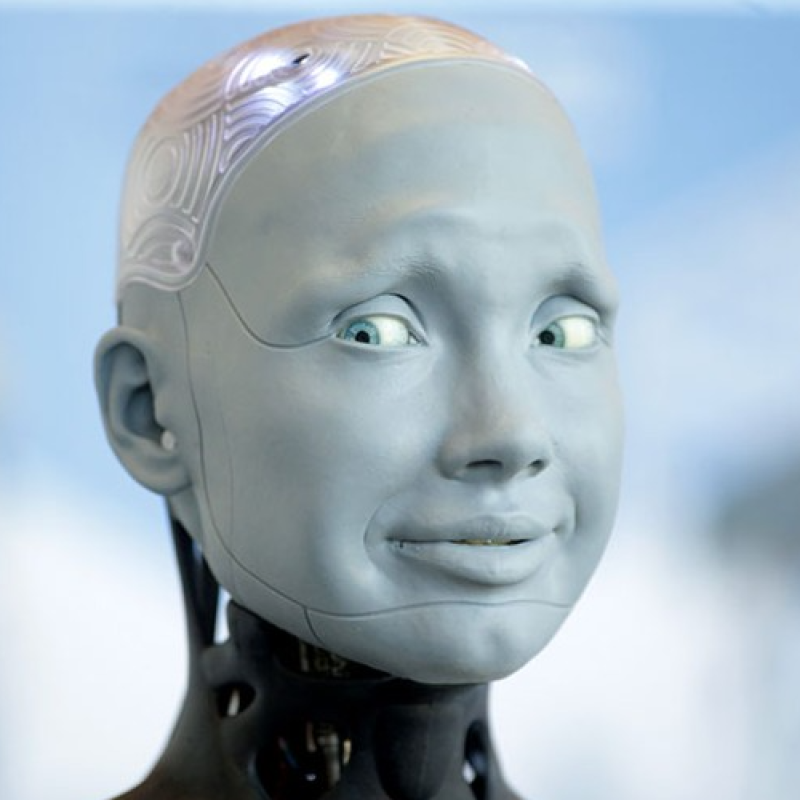Sympathy for the Machine


The saddest piece of art I’ve ever seen is about a robot.
Actually, it is a robot.
It’s a mechanical arm by artists Sun Yuan and Peng Yu that must continually push a leaking liquid back into its body to function.
And here’s the thing — I know, rationally, this art installation is not alive.
Like every machine, it is, by definition, something artificial.
And no matter how advanced robots become, they’ll never have… souls....

Yesterday, Perrie seeded an article on AI.
This came across my screen today. "What is a person?" is one of my favorite topics because people answer without really thinking it through.

Tags
Who is online
106 visitors

"Soul" is a relatively new idea. It did not exist in Biblical times... which kinda makes nonsense of an awful lot of "Christian" posturing.
Nonsense? In what way? Before answering, please read
Paywalled.
Interesting. Could you post a link? It's always good to know the source of any information.
I don't pretend to be an expert on the Bible, either OT or NT. On the other hand, I do have some sources which seem to me to be worthy of confidence. They pretty much agree that many of the subjects that are so important to modern "Christians" just weren't on the table two or three thousand years ago.
This text uses the verb "seem" quite a lot. Something like "like after death" cannot be a minor topic for a religion. It's a topic that would necessarily be treated in detail. There would be solid affirmations, not hints.
As I said... interesting.
Is There an Expectation of Eternal Life in the Old Testament? - Topical Studies (biblestudytools.com)
Would you share them?
Some examples would be?
Not necessarily. Not if the afterlife was so taken for granted that going into detail about it would be going into detail about how walking off a high cliff will kill you. Even in the paleolithic era, bodies were buried with tools and other status symbols, apparently because they thought it would help the deceased in the afterlife in some way. There is plenty of evidence throughout time that all, or nearly all civilizations held some sort of belief in an afterlife. Why go into detail about what was already understood? For instance, why would King Saul seek out the Witch of Endor to raise the spirit of Samuel if he did not first assume that Samuel still existed in some way? It appears to be a part of his worldview already.
I subscribe to two Patheos channels, " Progressive Christian " and " Best of Patheos " Vox and The New York Times occasionally have religion / ethics articles, and they're almost always worthwhile.
I subscribe to quite a few other sources which have interesting stuff once in a while. Eclecticism and variety!
Christian theology was not born into existence complete.
Human beings will inevitably experience self-consciousness, It is not inevitable for robots.
I did a deep search and could not find one ... must explain the dust farts and rust.
Why are all the comments in bold print?
major malfunction
It's called the Outis Glitch.
The comments should be interesting since they will be coming from mostly Christians but I will throughout speak on what most Indians believe when it comes to having a soul. All tribes believe that we have two souls since all other things on earth have a soul. Some tribes believe that we have as many as five souls.
The Anishinaabe also known as Ojibwe, Chippewa, and Saultex believe that we are comprised of a physical body and two distinct souls. One is the seat of intelligence and experience (jiibay) which leaves the body during sleep and the other is in the heart (ojichaag) where it stays until the body dies and it is freed. We believe that dreams have come from the soul, not the mind. The life cycle and old age are considered paths to a world of profound relationality. It is much more complicated than my short explanation but it will give you an idea of how different the Christians and indigenous people are.
The practitioners of our belief are the Mide who are members of the ancient Midewiwin society also known as the ''Grand Medicine Society'' over a thousand years old it takes them 20 years to reach the highest level of mide which is someone that helps cure the body but also must cure the mind and soul since they are all related.
Looking forward to the comments on this article.
Unfortunately, Outis, I'm unable to open the seed, and in fact most of the seeds you post, so it is difficult for me to comment intelligently on most of your articles. The only thing I can contribute here is ask you if you have ever watched the movie Bicentennial Man, which might have passing relevance here.
I'm sorry, Buzz. Truly. If I knew a work-around, I'd give it to you.
You know the saying, "A picture is worth a thousand words"? Well, a video........
It's okay, Outis, I'll follow as best I can cause at least I know you're posting good stuff on the site.
It's body is mechanical. So no I would not be sad for it. What is. . . interesting. . . is I found it futile and strangely emotional that it seemed to 'want' to live by replacing what was trying to get away from it. Because of the way the motion of the arm and its adjoining liquid moving away like . . . blood flowing. . . I was 'moved.'
Then, I realized that its the narrative that needs to change. It is a machine entirely, and specifically a thing. . . not human at all. . . and certainly not capable of understanding itself to be seeking to live beyond the act of sweeping up liquid that surrounds it.
It seems the artist succeeded.
Please elaborate.
I'd guess that your reaction is pretty close to what the artist wanted to provoke.
You actually thought about the work, something that most people, sadly, do not do.
Your perception of the work has evolved, as your reflection proceeded. That's what an artist is hoping for.
As a long-term fan ("trekkie-lite"), I saw the original airing of the episode regarding "Data" and his case for personal autonomy and I fully understand and accept the powerful bonding that goes on between humans and animals (in this case a machine ), after all the years long series, "Star Trek: The Next Generation" was a testament to human and machine interactions where there were many and mighty crucibles engaged in and won. Thus, a bonding or connection between ' man ' and machine was made concrete through mutual sharing in good times, tragedies, and long periods of interacting together.
Our world has engaged in the phenomenon of family pets 'becoming' more than beasts around the house or yard. They are treated as family:
Though this one ad is "for the dogs" the sentiment takes place for all sorts of animals that lodge themselves in the human psyche and its households. However, these relationships take place across decades that bond humans with their animals, respectively.
And while it is possible to talk, listen, and take as a muse a thing like, "Alexa" with its certain name-and its "abilities" to cause us to emote by what it gives us back in return-it is a service-machine processor. It can be made , we say, 'smarter.' But not through its professional or private "experiences" because it can not have those.
Getting back to Data; in the episode. . . the android 's arm is removed during trial to qualify and quantify its autonomy and it is done so with the "permission" of Data. The scene is shocking to the viewer who has come to think of Data as 'family.'
The distinction between Alexa and Data being Alexa is 'static' and the Data is interactive - with people. Data amasses 'interplay' and from it remembers the experiences.
Therefore, "Data" can be given the sum of its 'being.' It can be granted "existence" and control over its parts too. It can be made to 'feel' through synthetic methodologies, it may even manifest "intangibles" like love for one person over another person or group of persons. But, artificial beings can not manifest a state of "soul" or spirit, because do suggest it would be to suggest that as some humans believe in the 'Beyond' . . . machines, Alexa, and Data androids can have religion and a belief in life beyond this world. (Where soul, if it be so, would manifest itself.)
It seems to me that human society may evolve in two principal directions: toward kindness or toward power. The kindness path, I believe, leads inevitably to a recognition that all creatures are worthy of respect. If Putin and Trump have their way, our species will lose decades, but will, i think, eventually get on this path to recognition of animal rights.
Lab-created "meat" exists already. It fascinates me. (I'm a carnivore, not a vegan... but I'm a dying breed.) Lab-grown "meat" covers all the same nutritional needs as "killed" meat, without any moral qualms. I find it fascinating that some people nevertheless oppose lab-grown "meat" on moral/ethical grounds. To me, that's just more "nothing may change!"
Well, that was quite the discussion "killer" as it touches nothing about the article and the comments made. Better luck next time.
... and here I thought I was agreeing with you...
I don't see where to connect your 10.1 to my 10. You are worthy of respect, nevertheless! Come back.